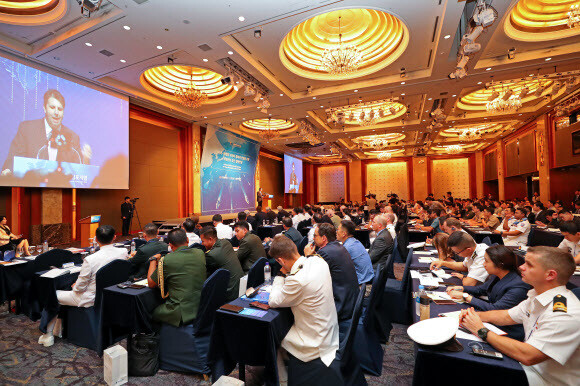hankyoreh
Links to other country sites 다른 나라 사이트 링크
Former US ambassador to S. Korea calls for stronger alliance between two countries

Former US Ambassador to South Korea Mark Lippert called for a stronger partnership between South Korea and the US in remarks on Sept. 3, predicting that changing dynamics in the Asia-Pacific region would usher in fundamental changes over the next decades.
Lippert’s remarks came in a keynote speech that day at the International Seapower Symposium, an event jointly organized by the South Korean Navy, Korea Institute for Maritime Strategy, and Sea Lanes of Communication Study Group–Korea at Seoul’s Lotte Hotel. Noting the professionalism and concrete successes of the South Korea-US alliance, he predicted that it could claim an even more favorable position within that process. Lippert served as US Ambassador to South Korea under the Barack Obama administration from October 2014 until the inauguration of current US President Donald Trump in January 2017.
Mentioning China, India, and Indonesia as major agents of change in the Asia-Pacific region, Lippert predicted the stronger alliances and partnerships could be established in the region if those countries adopt an approach rooted in a rule-based international order. He went on to name five elements of power that would undergo reorganization in the region: diplomatic policy, dynamics, the Fourth Industrial Revolution, economic strength, and population. Regarding the Fourth Industrial Revolution, he noted that South Korea and the US boast the world’s top experts, commercial technology, and innovation centers in terms of research and development.
Lippert remained quiet on the resumption of denuclearization talks between Pyongyang and Washington and the issues raised with the US’ expression of “strong concern and disappointment” following South Korea’s announcement that it was pulling out of its General Security of Military Information Agreement (GSOMIA) with Japan. Toward the end of his speech, Lippert said he would not comment on North Korea because he did not want to give the false impression that Pyongyang was being threatening or that the US was disregarding Pyongyang.
The theme of this year’s International Seapower Symposium – the event’s 14th edition – was “enhancing maritime security cooperation for peace and prosperity in the Asia-Pacific.” It was attended by around 300 people, including security experts and oceanographers from eight countries (South Korea, the US, the UK, China, India, Germany, Japan, and Norway) and military officers from 18 countries. In an opening address, South Korean Navy Chief of Staff Adm. Shim Seong-sup noted the competition about countries in the Asia-Pacific region to pursue maritime sovereignty and interests.
“We need to identify the best ways of maximizing everyone’s interests, pursuing cooperation rather than competition and trust rather than conflict,” he stressed.
By Yoo Kang-moon, senior staff writer
Please direct comments or questions to [english@hani.co.kr]

Editorial・opinion
![[Editorial] Does Yoon think the Korean public is wrong? [Editorial] Does Yoon think the Korean public is wrong?](https://flexible.img.hani.co.kr/flexible/normal/500/300/imgdb/original/2024/0417/8517133419684774.jpg) [Editorial] Does Yoon think the Korean public is wrong?
[Editorial] Does Yoon think the Korean public is wrong?![[Editorial] As it bolsters its alliance with US, Japan must be accountable for past [Editorial] As it bolsters its alliance with US, Japan must be accountable for past](https://flexible.img.hani.co.kr/flexible/normal/500/300/imgdb/original/2024/0417/6817133413968321.jpg) [Editorial] As it bolsters its alliance with US, Japan must be accountable for past
[Editorial] As it bolsters its alliance with US, Japan must be accountable for past- [Guest essay] Amending the Constitution is Yoon’s key to leaving office in public’s good graces
- [Editorial] 10 years on, lessons of Sewol tragedy must never be forgotten
- [Column] A death blow to Korea’s prosecutor politics
- [Correspondent’s column] The US and the end of Japanese pacifism
- [Guest essay] How Korea turned its trainee doctors into monsters
- [Guest essay] As someone who helped forge Seoul-Moscow ties, their status today troubles me
- [Editorial] Koreans sent a loud and clear message to Yoon
- [Column] In Korea’s midterm elections, it’s time for accountability
Most viewed articles
- 1[Column] The clock is ticking for Korea’s first lady
- 2[Editorial] When the choice is kids or career, Korea will never overcome birth rate woes
- 3S. Korea, Japan reaffirm commitment to strengthening trilateral ties with US
- 4Samsung barricades office as unionized workers strike for better conditions
- 5[Guest essay] How Korea turned its trainee doctors into monsters
- 6Gangnam murderer says he killed “because women have always ignored me”
- 7Japan officially says compensation of Korean forced laborers isn’t its responsibility
- 8[Editorial] As it bolsters its alliance with US, Japan must be accountable for past
- 9Korea, Japan jointly vow response to FX volatility as currencies tumble
- 10[Column] “Hoesik” as ritual of hierarchical obedience